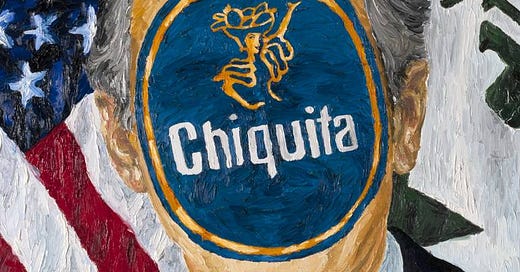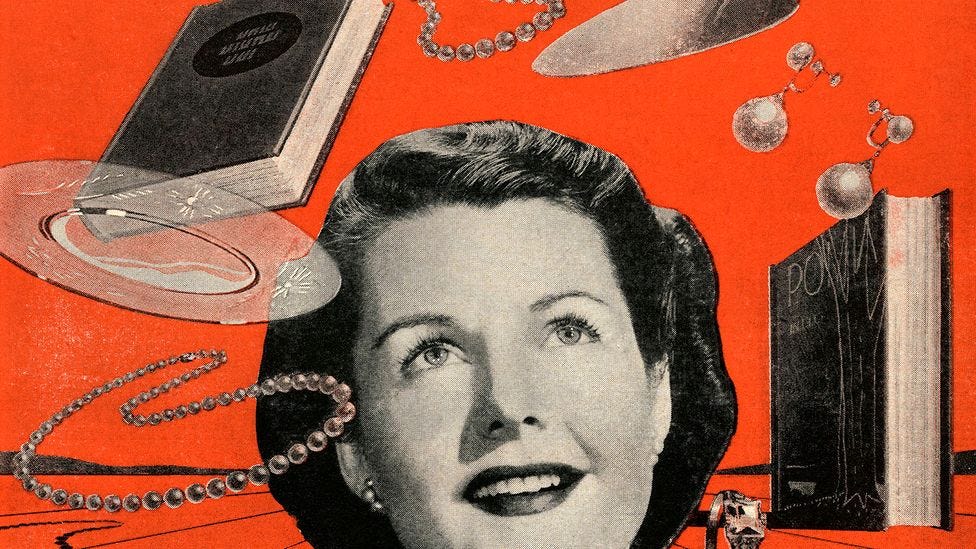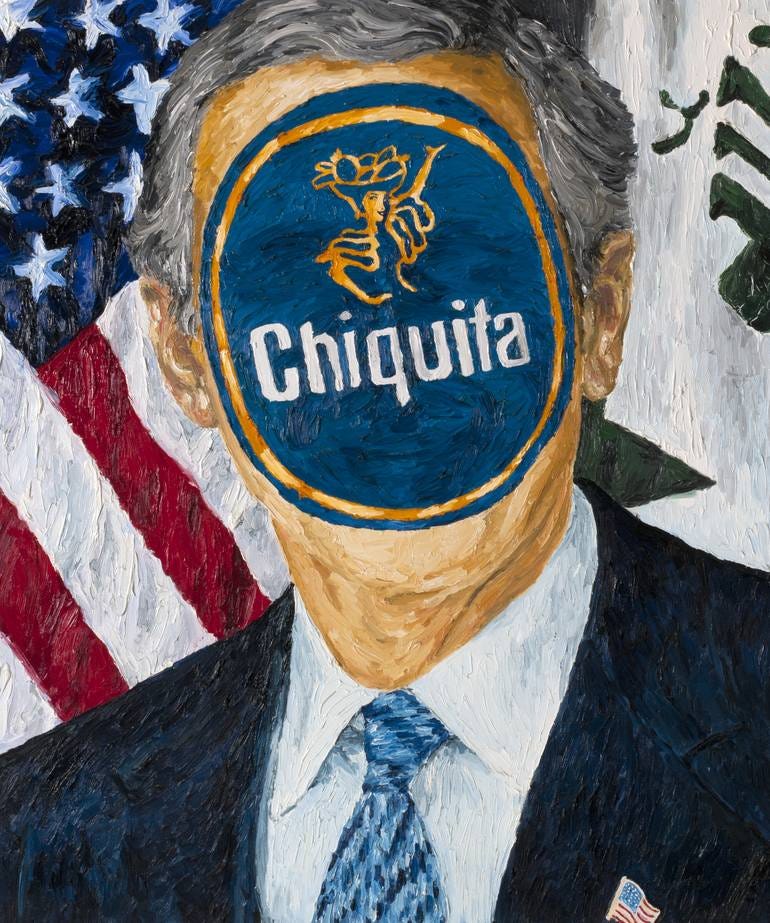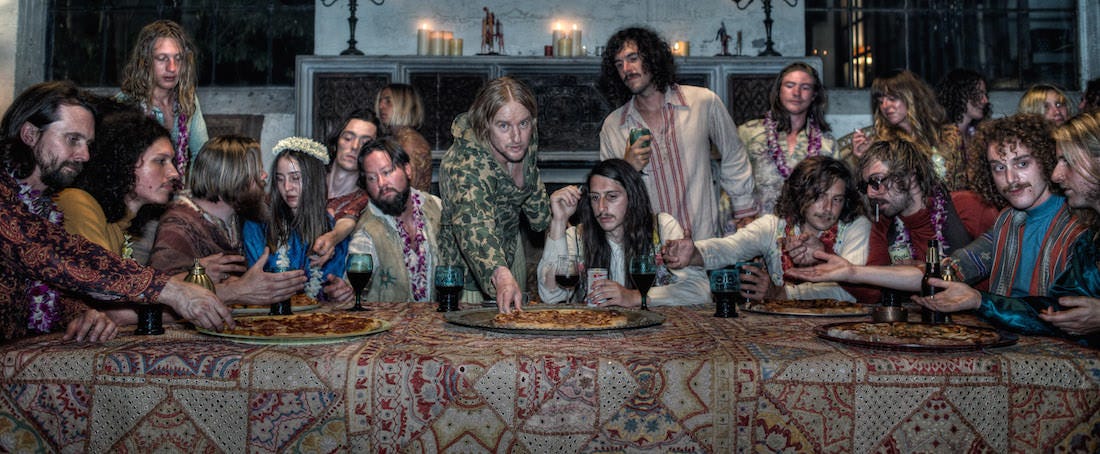Gravity's Rainbow - Part 1 - Chapter 2.1: Banana Republic
Analysis of Gravity's Rainbow, Part 1 - Chapter 2.1: Banana Breakfast
Consumption is so engrained in our society that the vast majority of the population rarely gives a thought to where or how our goods are secured. The more necessary the components of life, the less one thinks on their creation or accumulation. For instance, the exploitation of populations around the globe is well known in regard to certain random unnecessary trinkets labeled things like Made in China. Unnecessary, here, is the key word. Many of us are able to pat ourselves on the back knowing we are not feeding the exploitative practices in these sweatshops by purchasing products that will be thrown out sometime in the next year, or even the next few weeks. Move down the line through the necessities of modern life and you begin to see lesser-known forms of exploitation: those electronics and automobiles made in maquiladoras south of the US border1 or fast fashion made on slave ships just off the coast of Southeast Asia.
But what about the most basic human need: food. What better for us than to have endless possibilities regarding these products if they bring us so much joy? Which is why the exploitation of this facet of consumption is virtually unspoken of. Hence, Pirate Prentice’s infamous Banana Breakfast. Bananas as the choice of consumption leads the reader to the United Fruit Company (now known as Chiquita) — seemingly harmless in name alone, but in reality, one of the greatest exploiters of human labor to exist. They are the poster child for capitalist imperialism, spreading their arms wide and far (known by natives as el pulpo or The Octopus), employing what basically amounted (and still amounts, though under a different name) to South American slave labor in order to harvest as much profit as possible so the Western world could maintain its favorite snacks. To this day, un(der)paid labor and child labor are still how we maintain such easy access to these products, but we rarely hear about this.2 The phrase Banana Republic even goes unnoticed to your typical consumer — it is now known as a simple clothing brand as opposed to its more horrifying origins.
The banana is compared to the rocket that Pirate saw in the final scene when he imagines that "God has plucked it for him, out of its airless sky, like a steel banana" (8). Both the rocket and the banana serve as symbols for the destruction of a society that was built for the people. It is now built for the corporations and the elite to profit on the people and all that we can see in regard to our imminent death is that "Danger’s over, Banana Breakfast is saved" (8). We hear songs and dances, pieces of propaganda, that flow out of the Aether, telling us this world of gluttony is worth fighting for: "have a bana-na / Brush your teeth and go toddling off to war" (8).
Why then, instead of simply the bananas, does Pirate indulge in the massive swathe of breakfast foods? Why the "tall cruets of pale banana syrup," the "giant grazed crock where bananas have been fermenting since the summer?" (10). Walk down any supermarket aisle to find the answer. You’ll see dozens upon dozens of brands of chips, each with different but similar flavors, textures, crunch levels; various brands of toothpaste with a slightly more effective method of whitening or cavity prevention; six different types of blenders at various price ranges in your choice of color and performance; apples and oranges with varicolored stickers, some organic, some not. It is simply another illusion of choice — the fact that we have an infinity of possibilities to choose from to make our lives more whole, more perfect, so that we can work on the best version of ourselves. And with that, what is better than to open up the windows as we cook our breakfast and "let the kind scent blanket all [the world]? As a spell, against falling objects . . ." (10).
Pirate can be given some leeway though, as we see him growing these bananas on his rooftop as opposed to simply consuming those which are picked in plantations. He represents, as he did last chapter being the usurper and the usurped, the middle ground of our modern world. He was formed in a world built on consumption, and must still consume to find happiness, but he has forgone the exploitative process of attaining these products and has taken upon himself to create instead. Nevertheless, he has been trained to not ponder the origins of his addiction — at least, not yet.
There is also something to be said about the communal aspect of this scene. Despite it being built on colonization and exploitation, to some extent, Pirate and his group have made the best of it. They are not only reveling in the food itself, but in sharing the food. The scene is the embodiment of the quote, ‘There is no ethical consumption under capitalism.’ We can’t blame Pirate and Company, nor is it even beneficial to criticize him. The world is built around us to require these addictions, so why not find some joy in each other while we can? Why not celebrate in the one of the most communal events of all — the simple act of cooking for someone that you love. So, again, through a less bleak lens this time, "let the kind scent blanket all [the world.] As a spell, against falling objects . . ." (10). Maybe distractions are a necessity, at times, to keep us sane.
I split up Chapter 2 because next week’s is going to be lengthy. Reason being, it is the first section of the book that I’m not confident about (always going to be honest with you all) so it includes a lot of my random theorizing and word vomiting. Which is way more fun for me, to be honest, so I hope my semi-insane thought process works for you!
Up Next: Part 1, Chapter 2.2
Check out Roberto Bolaño’s 2666 for a brilliant novel regarding the topic of this essay in its relation to the exploitation of Mexican women, the degradation of human life due to capitalism, and our society’s ingrained fascination with violence.
I highly recommend doing more research into the historical and modern-day exploitation of the UFC/Chiquita. There is far more to be learned, and I just wanted to give a brief overview in order to touch on the themes. But knowledge of this group serves as a great basis for understanding Pynchon’s world view.








Yes.
The pairing of Pirate with bananas gives the reader a preview of how Pynchon creates a ghost set and setting for the novel. In every appearance, the novel takes place mostly in Europe in the 1940s. But it is also always taking place in America in the 1960s, the moment in which he was writing. Much of what was to happen with United Fruit was in the future in Pirate's time and place, but it would be forefront of mind for the American post-hippy liberal. So make the English character in the novel carry the metaphorical weight of the United Fruit Company, and give ol' Slothrop a break. Also, it allows him to introduce these themes before Slothrop enters the novel.
Take care as you read not to lose touch with the libidinal pleasure, the humor, the camp. It's a good banana song. "the hair of the dog that not without provocation and much prior conditioning bit them last night." Shows how one of Pynchon's techniques is to always say the thing that's between the thing.
I agree with Pirate as a middle ground; despite working for British intelligence, he is a sympathetic character. In fact, I think most of the individual characters in the novel live somewhere in this middle; most of the people in the book, the reader gets along with, wants to hang out with, and if they work on the side of the Rocket, that is not their own fault but the fault of their world. Each person within that Force is navigating their own life, always weighing the moral cost of complicity, always at least vaguely in touch with the Counterforce. Except Blicero.
So, what's the 'stack policy on spoilers? As you allude to, Pirate switches sides by the end of the book; the last time we see him, he's working for the Counterforce. Did I ruin the book for you? Just testing the waters.
2666 is one of my favorite novels. It is quite brutal though.